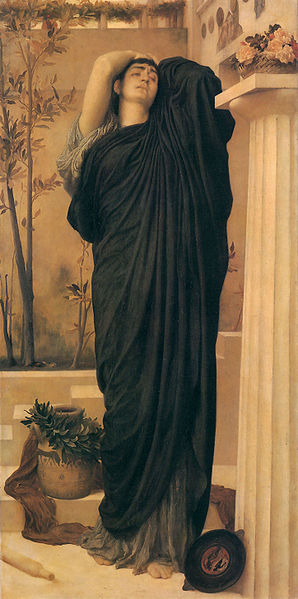Euripides
Electra
Date
Uncertain - style says about 419-416 BC, but reference by Castor to ships sailing to Sicily suggests the play may have been "kept" until 413 BC, when a fleet sailed in vain to rescue the Sicilian expedition. We don't know whether Sophocles' Electra was written earlier or later. Some scholars like the idea that it was written after Euripides' to restore the heroic dimension which Euripides had undermined.
Plot
 The theme of the killing of a mother and her lover by a son and daughter is treated quite differently by the three tragedians. To Aeschylus in Libation Bearers (Choephoroi) it was a problem, to Sophocles it was a drama, to Euripides a crime. Sophocles glosses over the murder of Clytemnestra, and focuses attention on Aegisthus. Euripides sets Clytemnestra in the centre, and makes her an object of pity, while Electra is a psychopathic amazon. Aegisthus is courteous to the murderers (Orestes and Pylades), but they stab him in the back while he is performing a religious act.
The theme of the killing of a mother and her lover by a son and daughter is treated quite differently by the three tragedians. To Aeschylus in Libation Bearers (Choephoroi) it was a problem, to Sophocles it was a drama, to Euripides a crime. Sophocles glosses over the murder of Clytemnestra, and focuses attention on Aegisthus. Euripides sets Clytemnestra in the centre, and makes her an object of pity, while Electra is a psychopathic amazon. Aegisthus is courteous to the murderers (Orestes and Pylades), but they stab him in the back while he is performing a religious act.
Euripides' purpose
Euripides is concerned to attack the blood-feud, the mother-murder, the doctrine of an eye for an eye, and the escalation of violence: all this in the context of a world at war. He attacks Apollo, the god who orders the actions: at the end the Dioscuri give divine sanction to the rejection of divinity. He also attacks the double standard for men and women: Electra dominates the play; he is fascinated by her psychology (compare her with Medea). There is only one decent character in the play - the unappreciated peasant to whom Electra is married.
Points of dramatic technique
The stage building is a cottage, not the palace. Electra is desssed in rags, and takes a pride in her unkempt appearance. Her opening speech and first song are brilliantly handled. The recognition scene is given a touch of realism, and directly parodies Aeschylus. Euripides also criticises the the ease with which the murderers gain access to the palace in Aeschylus and Sophocles, and places the murders elsewhere.

